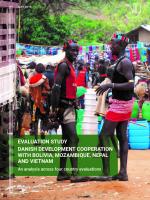Still a strong case for Danish bilateral development aid
A new study presents reflections for future Danish bilateral development assistance.
An analysis across four country evaluations of Danish bilateral development assistance provides for a set of findings concerning Denmark’s role as a development partner. The study presents 7 reflections for future Danish partnerships for development such as:
Reflection 1: Reassess the Danish approach to knowledge management and monitoring and evaluation
Reflection 2: Future (flexible) programming and implementation requires strong capacity at embassy-level
Reflection 3: There is a need to understand how targeting can be a strong instrument in Danish development assistance
The 7 reflections in all emerge from the evaluation’s focus on the overall approach and strategic choices made by Denmark in its cooperation with the four countries: Bolivia, Mozambique, Nepal and Vietnam.
The background for the study is the four evaluations commissioned after the 2015 decision to phase out the Danish programmes of bilateral development assistance in Bolivia, Mozambique and Nepal, and the 2013 decision to change to a development partnership with Vietnam. Evaluations of the long-term provision of development assistance to each country were launched in 2016. While all four evaluations assess the assistance over an extended period, they are not exhaustive assessments of results achieved across all sectors and engagements in the four countries. Nevertheless, they do provide a strong basis for examining the ways that Danish development assistance has adapted to changing contexts and challenges in the partner countries and to shifts in Danish development priorities.
The study was commissioned by the Evaluation Department (EVAL) of the Danish Ministry of Foreign Affairs (MFA to serve a dual purpose. First, to provide an analysis of main issues emanating from the four country evaluations to stimulate discussions as to what works in which contexts and under what circumstances. Secondly, the study should provide lessons learned for the conceptualisation of country programmes in the future.
DIIS Experts



